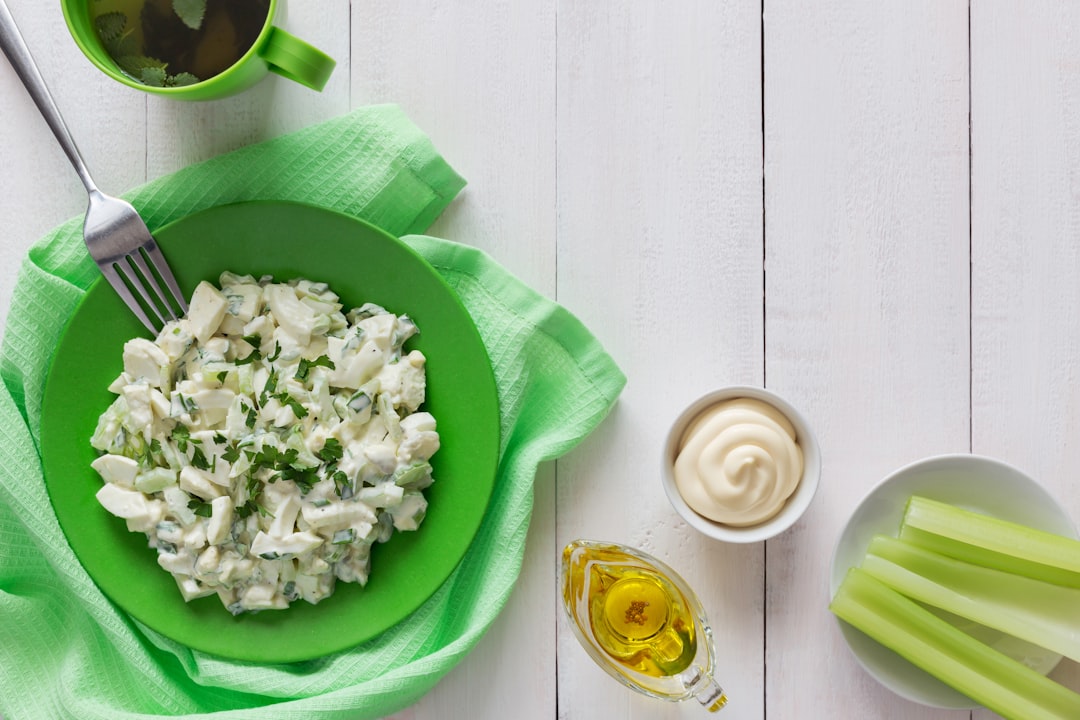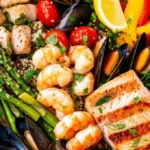Support our educational content for free when you buy through links on our site. Learn more
Can You Eat Eggs on a Flexitarian Diet? [2024] 🍳
Craving an omelet but not sure if it aligns with your flexitarian goals? We get it! The Flexitarian Diet, with its focus on plant-based eating, often raises questions about the role of eggs. 🍳 But worry not, our team of flexitarian experts is here to shed light on this delicious conundrum! Imagine a symphony of flavors – a vibrant salad with a poached egg, a hearty bowl of quinoa topped with a scrambled egg, or a fluffy omelet bursting with veggies. Is that a flexitarian dream or a culinary reality? Let’s dive in and uncover the truth about eggs and the flexible world of the Flexitarian Diet!
Quick Answer
Here’s the bottom line: You can most definitely enjoy eggs on a Flexitarian Diet! They’re a powerhouse of protein, essential nutrients, and culinary versatility. 🥚
- Eggs are a complete protein, packed with essential vitamins, minerals, and antioxidants.
- They are versatile and adaptable to various dishes, from breakfast to dinner.
- The Flexitarian Diet encourages flexibility and prioritizes plant-based foods while allowing for occasional indulgences, including eggs.
👉 Shop Flexitarian Essentials Online:
- Eggs: 👉 CHECK PRICE on: Amazon | Walmart | Instacart | Eggs.com
- Quinoa: 👉 CHECK PRICE on: Amazon | Walmart | Instacart | Bob’s Red Mill Official Website
- Tofu: 👉 CHECK PRICE on: Amazon | Walmart | Instacart | Moringa Official Website
Table of Contents
- Quick Tips and Facts
- What is Flexitarian? A Gentle Introduction to the Flexitarian Diet
- The Flexitarian Diet’s Relationship with Eggs: Digging into the Details
- What Can You Eat on the Flexitarian Diet?
- Sample Shopping List for a Flexitarian Week
- The Pros and Cons of Embracing a Flexitarian Lifestyle
- Is the Flexitarian Diet a Healthy Choice for You? Exploring Individual Needs
- A Word From Verywell: Expert Insights and Guidance
- Conclusion: Finding Your Own Flexitarian Path
- Recommended Links: Diving Deeper into Flexitarian Living
- FAQ: Your Flexitarian Questions Answered
- Reference Links
Quick Tips and Facts
Eggs are a YES on the Flexitarian Diet. ✅ They are a powerhouse of protein, and their versatility makes them perfect for breakfast, lunch, or dinner. 🥚
The Flexitarian Diet is all about flexibility. 🤸 You can enjoy your favorite foods while still prioritizing plant-based options – think of it as a gentle nudge, not a rigid rule! 🌱
Flexitarian is not just a diet, it’s a lifestyle. 🌎 It’s about making conscious choices that are good for your health, the planet, and animals.
What is Flexitarian? A Gentle Introduction to the Flexitarian Diet

Imagine a diet that gives you the best of both worlds: the deliciousness of a meat-lover’s paradise and the health benefits of a vegetarian lifestyle. This is the Flexitarian Diet, a flexible approach to eating that prioritizes plant-based foods while allowing for occasional meat, poultry, or fish.
The Flexitarian Diet isn’t about eliminating anything. It’s about adding more plant-based goodness to your plate! It encourages embracing a more conscious approach to eating, prioritizing whole, unprocessed foods with minimal culinary intervention. 🌱 This means filling your plate with a symphony of fruits, vegetables, legumes, whole grains, and nuts – all the while enjoying meat, poultry, or fish for some special occasions or when you crave them.
If you’re thinking about a more sustainable lifestyle, the Flexitarian Diet could be a great launchpad.
Do you want to learn more about this flexible and approachable way of eating?
The Flexitarian Diet’s Relationship with Eggs: Digging into the Details
So, what about eggs? Can they have a place in a Flexitarian Diet? The answer is a resounding YES! Eggs are a complete protein, packed with essential nutrients like vitamins, minerals, and antioxidants.
- Protein Powerhouse: Eggs are a fantastic source of high-quality protein, which is crucial for building and repairing tissues, regulating blood sugar, and maintaining a healthy weight. One large egg can provide about 6 grams of protein, making it an excellent choice for those seeking to increase their protein intake. 💪
- Nutrient-Rich: They’re also a rich source of vitamins B12, D, and E, along with minerals like iron, zinc, and selenium. These nutrients play vital roles in supporting overall health and well-being, from energy production and immune function to cell growth and development.
- Versatile and Delicious: Eggs are remarkably versatile, easily adaptable to various dishes – savory or sweet! 🍳 They can be scrambled, fried, poached, boiled, or baked into countless recipes, offering endless possibilities for flavorful and nutritious meals.
The Flexitarian Diet emphasizes flexibility and personal choices. It’s about creating a sustainable and enjoyable eating pattern that aligns with your individual preferences and dietary needs.
What Can You Eat on the Flexitarian Diet?
The Flexitarian Diet features a diverse range of food groups, creating a beautifully balanced meal plan that satisfies your taste buds and fuels your body. Here’s a glimpse into the treasure trove of foods you can enjoy:
Plant-Based Powerhouse:
- Fruits: Fresh, frozen, or dried. Apple, banana, berries, grapefruit, oranges, pineapple, etc. 🍎
- Vegetables: Embrace a vibrant rainbow of colors! Broccoli, cauliflower, carrots, spinach, kale, bell peppers, etc. 🥦
- Legumes: Beans, lentils, peas, chickpeas – a rich source of fiber, protein, and iron. Beans, lentils, peas, chickpeas, etc. 🫘
- Whole Grains: Quinoa, brown rice, oats, barley, whole-wheat bread, etc. — fiber-packed and a fantastic energy source. 🌾
Occasional Indulgences:
- Meat: Lean cuts of beef, chicken, turkey, fish, etc. 🍗
- Dairy: Milk, cheese, yogurt, etc. 🥛
- Eggs: They’re always welcome on the Flexitarian menu! 🥚
Remember, the Flexitarian Diet encourages a balanced approach. While it prioritizes plant-based foods, it allows for flexibility and occasional indulgence.
Sample Shopping List for a Flexitarian Week
Here’s a sample shopping list to help you stock your pantry for a week of delicious flexitarian meals:
Fruits & Vegetables:
- Apples
- Bananas
- Berries
- Grapefruit
- Oranges
- Broccoli
- Cauliflower
- Carrots
- Spinach
- Kale
- Bell Peppers
Grains & Legumes:
- Quinoa
- Brown Rice
- Oats
- Lentils
- Black Beans
- Chickpeas
Healthy Fats & Oils:
- Avocado
- Olive oil
- Nuts
- Seeds
Protein Sources:
- Eggs
- Tofu
- Tempeh
- Chicken Breast
- Salmon
Dairy & Other:
- Yogurt
- Cheese
- Almond Milk
- Spices
This list is a starting point; feel free to choose your favorite seasonal produce and other foods you enjoy.
The Pros and Cons of Embracing a Flexitarian Lifestyle
The Flexitarian Diet offers a range of advantages, making it an attractive option for many individuals. Let’s explore both the pros and cons to make an informed decision:
Pros:
- Flexibility: It adapts to your lifestyle and dietary preferences, so you can enjoy your favorite foods while incorporating plant-based options. 🤸
- Health Benefits: Studies have linked a flexitarian diet to lower risk of heart disease, diabetes, and certain cancers. ❤️
- Sustainable: It promotes environmental consciousness by reducing meat consumption. 🌎
- Easy to Follow: You can gradually make changes without feeling overwhelmed. 🌱
Cons:
- Potential Nutritional Deficiencies: If not carefully planned, a flexitarian diet could lead to deficiencies in certain nutrients, such as iron, vitamin B12, and omega-3 fatty acids.
- Challenging for Meat-Eaters: Those accustomed to a meat-heavy diet might find it challenging to adjust to a plant-based focus.
- Limited Social Options: It might be a bit tricky to navigate dining out or social gatherings where meat is the centerpiece.
The Flexitarian Diet can be a fantastic choice for many people. However, it’s vital to ensure that you’re getting all the essential nutrients your body needs.
Is the Flexitarian Diet a Healthy Choice for You? Exploring Individual Needs
The Flexitarian Diet can be a healthy and sustainable choice for many individuals seeking a balanced approach to eating.
It could be a fantastic option if:
- You want to improve your overall health and well-being.
- You’re looking to lower your risk of chronic diseases.
- You want to embrace a more sustainable lifestyle.
- You’re comfortable with a flexible approach to eating.
However, it may not be suitable for everyone.
Factors to consider:
- Individual Dietary Needs: If you have specific dietary restrictions or allergies, make sure the Flexitarian Diet can accommodate them.
- Level of Commitment: The Flexitarian Diet is about making gradual changes, so if you’re not ready for a significant shift, it might not be the right fit.
- Access to Food and Resources: Make sure you have access to diverse plant-based foods and resources to support your transition.
Ultimately, the decision to embrace the Flexitarian Diet is personal.
A Word From Verywell: Expert Insights and Guidance
Experts at Verywell Fit emphasize the importance of individualization when it comes to dietary choices. They encourage a gentle approach to incorporating plant-based foods into your diet, rather than focusing on strict rules or limitations.
They suggest consulting with a registered dietitian or a healthcare professional to create a personalized plan that meets your unique needs and health goals.
The Flexitarian Diet can be a fantastic journey of exploration, discovering new foods, and enriching your culinary experience.
Are you ready to embark on your own flexitarian adventure?
Conclusion: Finding Your Own Flexitarian Path

The Flexitarian Diet is more than just a diet – it’s a philosophy of eating. It encourages conscious choices that benefit your health, the planet, and the animals. 🌿
It offers a gentle path towards a more plant-based lifestyle. With its emphasis on flexibility and personal choice, it allows you to gradually incorporate plant-based foods into your routine.
Remember, it’s a journey – not a destination.
You can start by making small changes, like swapping out meat for beans or lentils once a week. As you become more comfortable, you can increase your intake of plant-based foods.
Recommended Links: Diving Deeper into Flexitarian Living
👉 Shop Flexitarian Essentials Online:
- Eggs: 👉 CHECK PRICE on: Amazon | Walmart | Instacart | Eggs.com
- Toasted Almond Milk: 👉 CHECK PRICE on: Amazon | Walmart | Instacart | Almond Breeze Official Website
- Quinoa: 👉 CHECK PRICE on: Amazon | Walmart | Instacart | Bob’s Red Mill Official Website
- Lentils: 👉 CHECK PRICE on: Amazon | Walmart | Instacart | Trader Joe’s Official Website
- Tofu: 👉 CHECK PRICE on: Amazon | Walmart | Instacart | Moringa Official Website
Books on Flexitarian Diet:
- The Flexitarian Diet: The Surprisingly Powerful Plant-Based Way to Lose Weight, Prevent Disease, and Feel Great: Amazon
- The Flexitarian Cookbook: 175 Simple & Delicious Recipes to Help You Eat More Plants: Amazon
FAQ: Your Flexitarian Questions Answered

Can flexitarians eat eggs?
Absolutely! Eggs are a great source of protein and are a staple in a flexitarian diet.
Read more about “Can you lose weight on a flexitarian diet? …”
Can you eat cheese on a flexitarian diet?
Yes, you can. Dairy products, including cheese, are allowed in moderation on the Flexitarian Diet.
Read more about “What is the Disadvantage of Flexitarian Diet? … 🌱”
Can flexitarians eat pasta?
Yes, but prioritize whole-grain pasta. It’s a good source of fiber and nutrients.
How many times a week do flexitarians eat meat?
There’s no hard and fast rule, but the general idea is to reduce animal product consumption. So, you might enjoy meat 1-3 times a week, or even less often.
Read more about “How many times a week do flexitarians eat meat?”
Can flexitarians eat fruit?
Definitely! Fruits are essential for a balanced flexitarian diet.
Reference Links
- USDA Food Composition Databases: USDA
- Almond Breeze: Almond Breeze
- Bob’s Red Mill: Bob’s Red Mill
- Trader Joe’s: Trader Joe’s
- Moringa: Moringa
- Verywell Fit: Verywell Fit
The Flexitarian Diet can be a delicious and empowering journey towards a healthier and more sustainable lifestyle.







